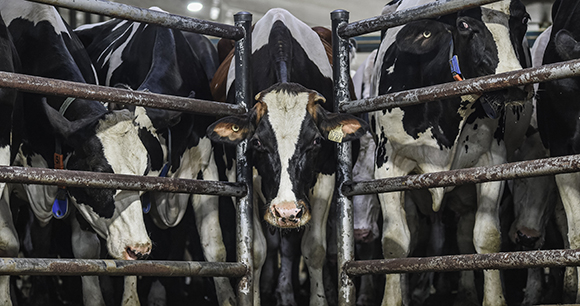
Washington, DC—In a letter delivered today to the National Milk Producers Federation (NMPF), the Animal Welfare Institute (AWI) urged the industry group to improve its welfare standards for dairy cattle to better meet consumer expectations of products from animals.
The Farmers Assuring Responsible Management (FARM) program, implemented by NMPF, is in the process of updating its animal care guidelines. According to the program description, FARM provides audits and certification for dairy producers and processors based on standards in five categories, including animal welfare.
In order to ensure the guidelines reflect current scientific knowledge, AWI urged FARM to, at a minimum, adopt the dairy welfare standards of the World Organisation for Animal Health (WOAH). AWI’s recommendations address a number of crucial areas, including housing, transport, emergency preparation, and overall compliance.
With respect to housing, AWI recommended that calves be housed for the first several months of their lives in pairs or groups rather than individually in hutches or pens (a common US dairy industry practice). Further, all cows should be allowed daily outdoor exercise. Such measures would offer cows and calves the opportunity to socialize and engage in natural behaviors, both of which are essential to their overall welfare.
AWI’s recommendations are supported by data from two recent consumer perception surveys, which revealed that a majority of consumers find common dairy industry practices unacceptable, including not allowing cows daily exercise and confining calves to individual hutches.
Regarding transport, AWI requested that FARM adopt WOAH’s transport fitness guidelines that seek to ensure animals are able to withstand the often long, grueling journeys. This recommendation is especially important, given that calves and cull cattle (cows determined to be no longer productive and sent to slaughter) are particularly vulnerable during these journeys. Calves, for instance, often die within a few weeks after transport from secondary infections resulting from lowered immune system function caused by transport stress.
The third category, emergency planning, is becoming ever more critical as extreme weather events become more frequent and deadly due to climate change. AWI suggested that producers be required to adopt specific emergency plans for known contingencies, as well as implement best practices for preventing barn fires, which kill hundreds of thousands of farm animals each year in the United States.
Finally, to ensure that the standards are meaningful and in line with consumer expectations, AWI strongly encouraged FARM to require compliance with all its animal welfare standards, including existing standards that specify calves should receive pain relief for disbudding, castration, and branding. Currently, only a little over half of FARM’s standards are enforced—meaning that a producer can fail to comply with dozens of standards without being decertified.
“Enforcing standards across the board is a necessary step if consumers are to have any confidence that the dairy industry is serious about improving its animal care standards,” said Dena Jones, AWI’s farm animal program director. “A program that allows nearly half of its standards to be purely voluntary does not represent an authentic certification program. We hope FARM will begin to take steps to remedy this serious deficiency.”
According to a July survey of more than 2,000 adults, 83% strongly or somewhat agreed that if a dairy industry trade group provides certifications to producers based on standards related to animal welfare, producers should be required to meet all standards before receiving certification.
Margie Fishman, Animal Welfare Institute
[email protected], (202) 446-2128
The Animal Welfare Institute is a nonprofit charitable organization founded in 1951 and dedicated to reducing animal suffering caused by people. AWI engages policymakers, scientists, industry, and the public to achieve better treatment of animals everywhere—in the laboratory, on the farm, in commerce, at home, and in the wild. Follow us on Facebook, Twitter, and Instagram for updates and other important animal protection news.